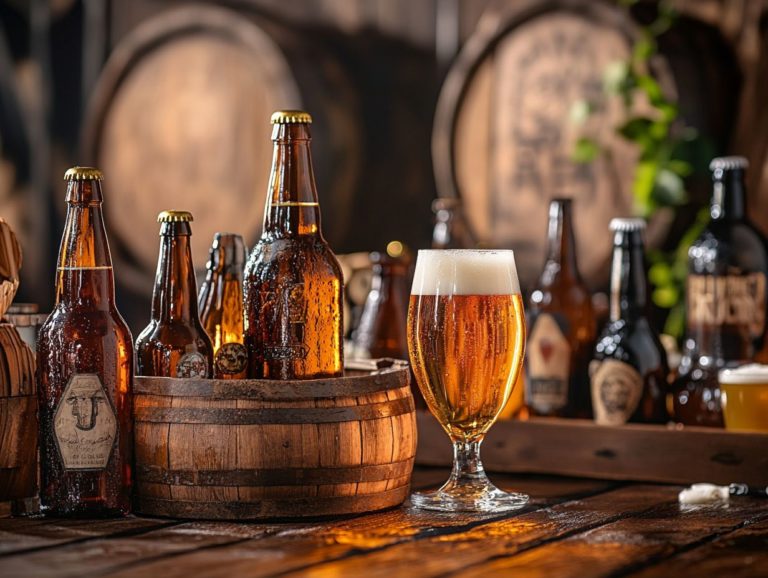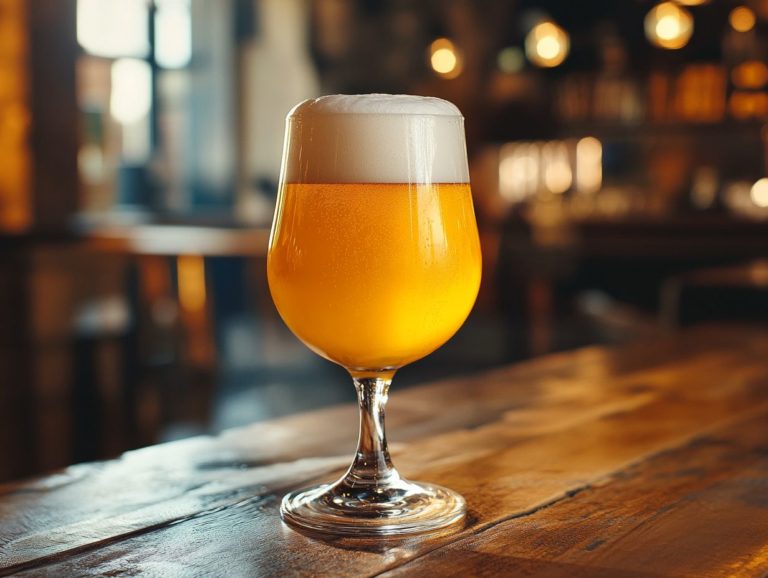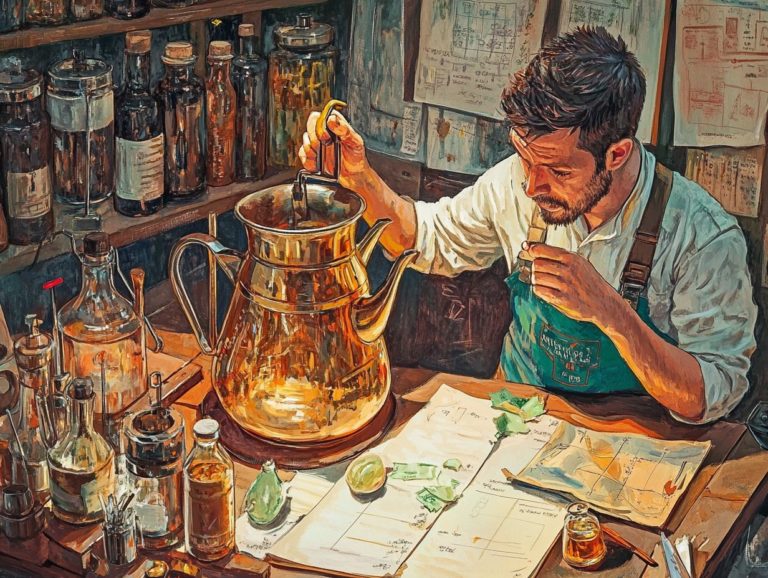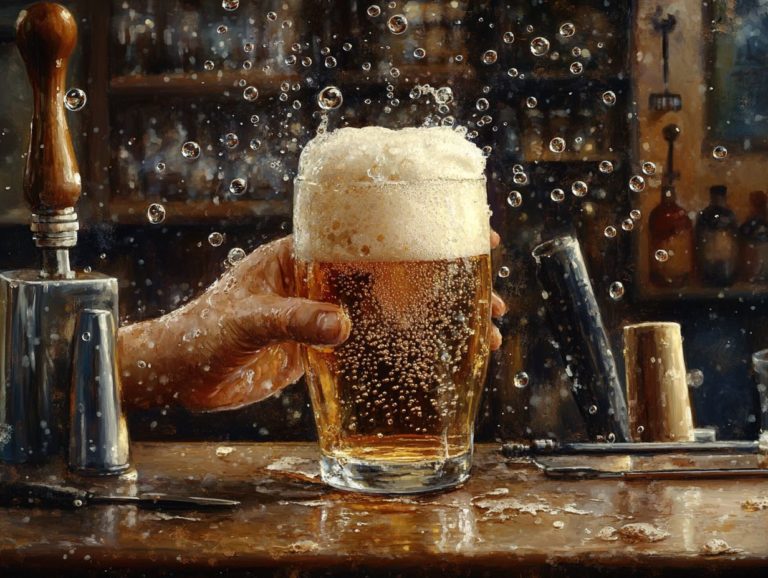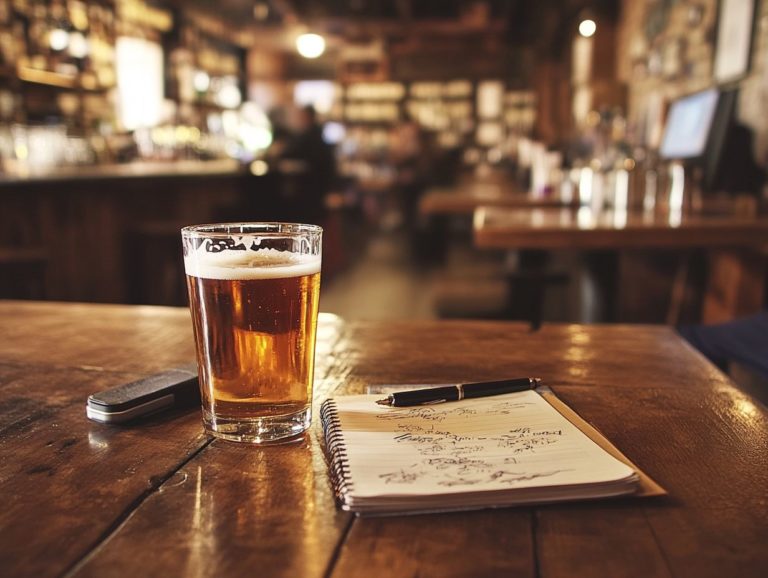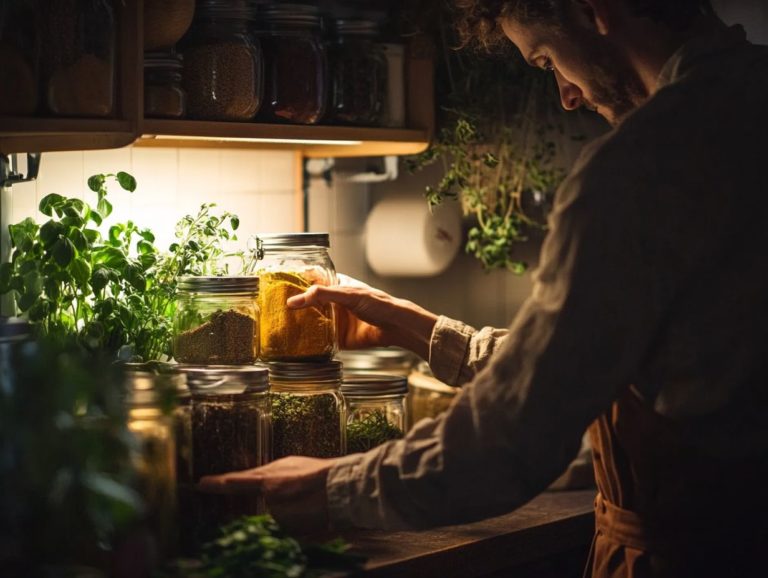What to Do When Your Beer Tastes Like Vinegar
Imagine cracking open a cold beer, only to be met with a surprising sourness that evokes the taste of vinegar. This unpleasant flavor can arise from several issues related to brewing, storage, or even beer contamination.
Together, we will delve into the reasons behind that vinegar-like taste, provide practical tips to prevent it, and guide you on what steps to take if you ever find yourself in this unfortunate predicament. From identifying bad tastes to mastering proper brewing methods, we’ve got you covered.
Whether you re a homebrewing enthusiast or simply enjoy a casual drink, grasping the intricacies of this phenomenon can significantly elevate your overall beer experience. Understanding the brewing process, from yeast fermentation to proper storage, can make a world of difference.
Contents
- Key Takeaways:
- Why Does Beer Taste Like Vinegar?
- How to Prevent Beer from Tasting Like Vinegar?
- 1. Proper Sanitation and Cleaning
- 2. Temperature Control
- 3. Quality Ingredients
- What to Do If Your Beer Tastes Like Vinegar?
- Can You Still Drink Beer That Tastes Like Vinegar?
- How to Prevent Beer from Turning into Vinegar in the Future?
- Crafting the Perfect Beer
- Frequently Asked Questions
Key Takeaways:
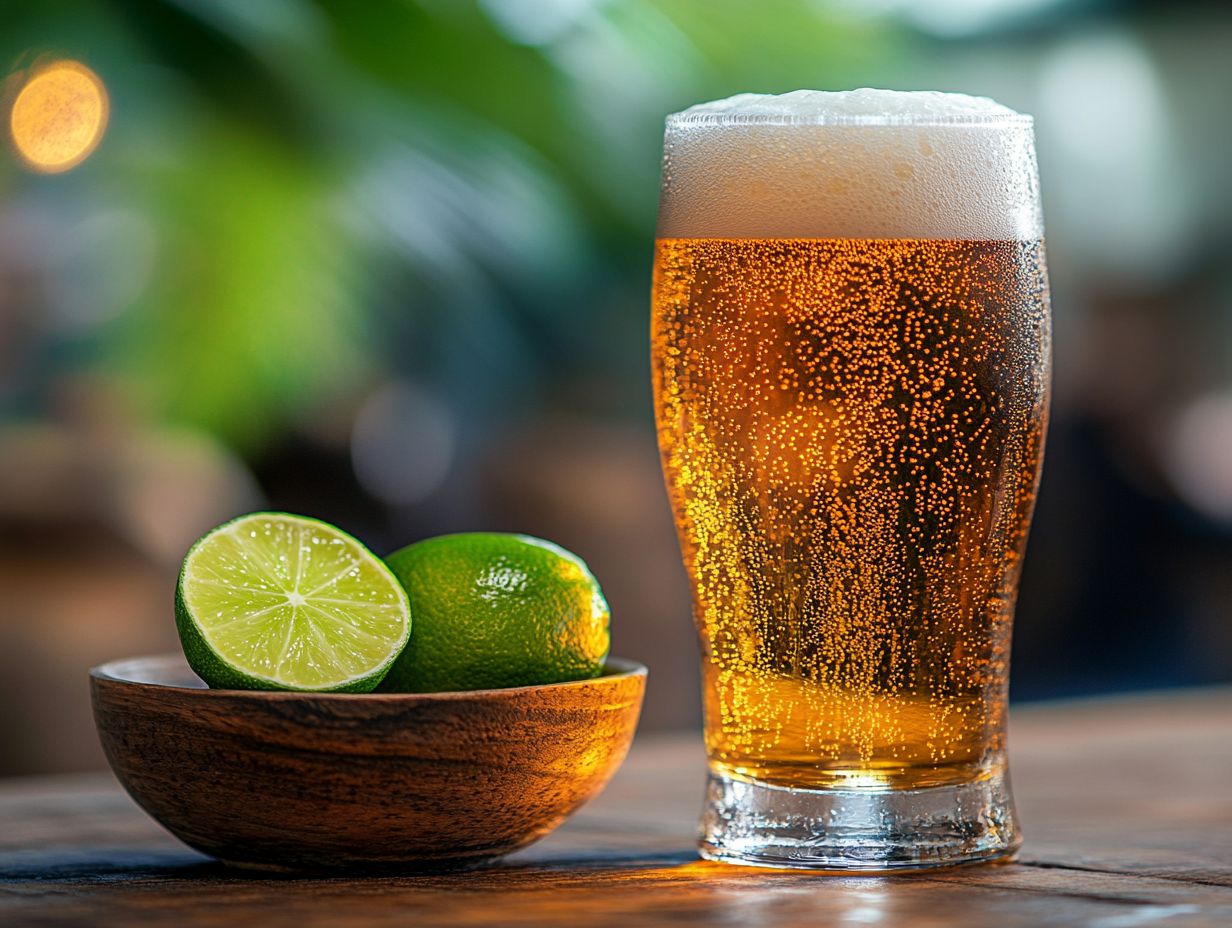
- Proper sanitation and cleaning, temperature control, high-quality ingredients, and precise brewing techniques can help prevent beer from tasting like vinegar.
- If your beer does taste like vinegar, check the expiration date, look for contamination, and try different storage methods such as cool, dark places to minimize light exposure.
- Depending on the intensity and potential health risks, you may still be able to drink beer that tastes like vinegar. To prevent it in the future, focus on proper storage, quality ingredients, keeping equipment clean, and understanding yeast pitching (adding yeast to the brew) techniques.
Why Does Beer Taste Like Vinegar?
Experiencing homemade beer that tastes like vinegar can be quite disheartening for any homebrewer. This frustrating issue typically stems from acetic acid, a byproduct of unwanted fermentation processes, especially when acetic bacteria like acetobacter sneak into your brew. This bad taste can turn a promising batch into a disappointment.
Understanding the reasons behind this vinegar-like taste is crucial; it can help you avoid similar mishaps in future batches and preserve the integrity of your brewing process. Factors such as oxidation significantly influence the flavor profile of your beer, making it essential for you to delve into these aspects to elevate the quality of your homebrew. Proper fermenter cleaning and the use of high-quality ingredients like Debittered Black Malt can also help maintain the flavor standards.
What Causes the Vinegar Taste in Beer?
The vinegar taste you might encounter in beer primarily arises from the production of acetic acid, typically due to bacterial infection, particularly from strains like acetobacter, during the yeast fermentation process.
This unwelcome flavor can emerge under certain brewing conditions, especially when sanitation practices are lacking. When the fermentation environment is compromised, factors such as temperature fluctuations, oxygen exposure, light exposure, and leftover sugars can promote bacterial growth.
Mastering yeast fermentation techniques is crucial for achieving the desired flavor profiles and steering clear of unpleasant bad tastes. By ensuring a thorough cleaning of your equipment and utilizing sanitized water, you can significantly diminish the risk of such infections, enabling you to craft high-quality beers that are free from the sour notes reminiscent of vinegar.
How to Prevent Beer from Tasting Like Vinegar?
Don t let vinegar ruin your homebrew excitement! To prevent your homemade beer from taking on a vinegar-like flavor, it s essential to adopt a comprehensive strategy that prioritizes proper sanitation, high-quality ingredients, and precise brewing techniques.
By thoroughly cleaning and sanitizing your brewing equipment, you can greatly minimize the risk of undesirable bad tastes emerging during fermentation. Careful control of fermentation conditions and managing yeast pitching with precision will enhance the overall quality of your beer.
Implementing these strategies will not only help you preserve the intended flavor profile of your brew but also elevate your entire beer-drinking experience.
1. Proper Sanitation and Cleaning
Proper sanitation and cleaning of your brewing equipment are crucial for preventing beer contamination and preserving the intended flavor of your homebrew.
To achieve this, it’s essential to establish a routine cleaning regimen that addresses all components, with a particular focus on fermenters, which are particularly prone to harboring unwanted bacteria and wild yeast. Begin by thoroughly rinsing your fermenters and brewing vessels with hot water to eliminate any residue from previous batches.
Next, employ a food-safe sanitizer, such as Star San or iodine-based solutions, to effectively neutralize any lingering microbial life. Don t forget to scrub all surfaces that come into contact with your brew, including siphon tubes, airlocks, and brewing equipment. Regular sanitation tips can help maintain beer quality.
By regularly inspecting and cleaning your brewing equipment, you enhance the quality of your beer and extend the lifespan of your tools, resulting in a more enjoyable brewing experience overall.
2. Temperature Control
Temperature control is an important part of the brewing process that can profoundly influence yeast fermentation and the overall quality of your homemade beer.
As you embark on your brewing journey, maintaining optimal temperature ranges is essential, as it directly impacts yeast activity and dictates the pace and efficiency of fermentation. Each yeast strain has its own ideal temperature range, typically between 60 F to 75 F, where it thrives. If the temperature soars too high, fermentation can become overly vigorous, potentially leading to bad tastes from unwanted byproducts like Diacetyl and DMS.
On the flip side, cooler temperatures can hinder yeast activity, resulting in incomplete fermentation and a beer that is sweeter and less carbonated than intended. By understanding these intricacies, you can master the art of brewing, skillfully adjusting your heating or cooling methods to achieve a balanced, flavorful final product.
3. Quality Ingredients
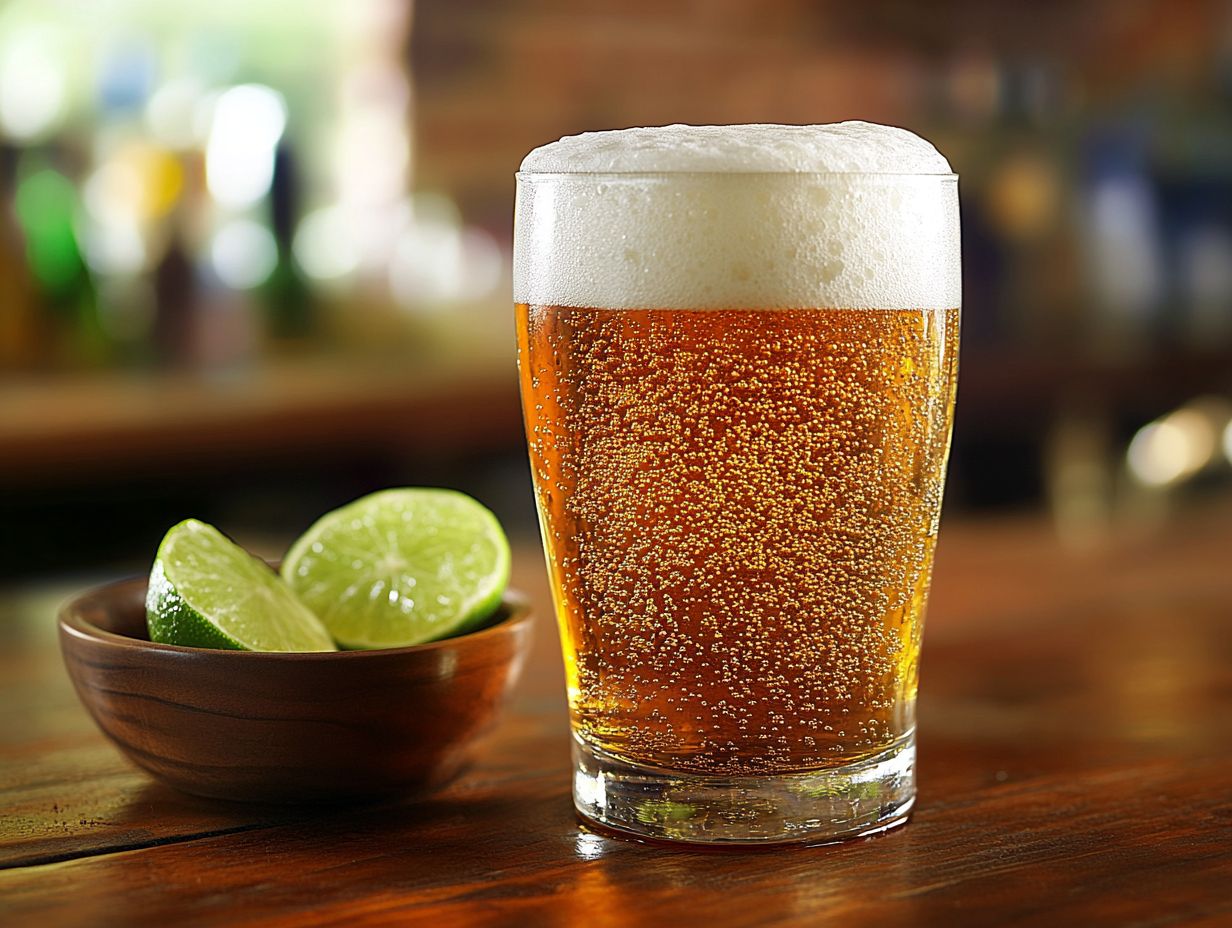
Using high-quality ingredients like fresh hops such as Cascade hops and Centennial hops, along with specialty grains like Debittered Black Malt is essential for crafting a flavorful homebrew beer free from bad tastes. The importance of selecting top-notch ingredients cannot be overstated; they are pivotal in shaping the character and depth of your beer.
Fresh hops bring unique aromatic and bitterness profiles to the table, transforming an ordinary brew into something exceptional, while specialty grains add rich, nuanced flavors and the desired color. For example, incorporating crystal malt can introduce sweetness and body, significantly enhancing the overall mouthfeel. Opting for quality yeast strains is equally important, as it ensures a consistent fermentation process a key factor in achieving a clean finish.
Ultimately, the right combination of these elements enables you to create a beer that is not only balanced and enjoyable but also a true testament to your craftsmanship.
What to Do If Your Beer Tastes Like Vinegar?
If your beer has taken on a vinegar-like taste, don t let it linger! Act quickly to identify and rectify the problem before it jeopardizes your future batches.
Begin by performing a comprehensive off flavor assessment, looking for any signs of contamination or subpar brewing conditions. Grasping the potential sources of this undesirable flavor will enable you to prevent similar issues down the line. This process should include off flavor identification to better understand the root cause.
Scrutinize your beer storage methods to protect your brew from further decline.
Start brewing with these tips today and enjoy better beer!
1. Check the Expiration Date
When your beer tastes more like vinegar than a refreshing brew, the first thing you should do is check the expiration date it can profoundly affect the overall quality of your beer.
Freshness is paramount; drinking a beer past its prime can lead to all sorts of unpleasant flavors and aromas. It s crucial to familiarize yourself with the shelf life of various beer styles. For instance, IPAs are best enjoyed fresh, while stouts or sours often improve with age. Referencing beer recipes can also help ensure you’re following best practices for each style.
Proper storage practices are also key to preserving that freshness. Store your beer in a cool, dark place to maintain optimal temperature and minimize light exposure. Keeping your bottles upright is wise, as it helps prevent sediment disturbance and keeps the clarity intact. These beer storage tips are crucial for maintaining beer quality.
By following these simple steps, you can ensure that every sip is a delightful experience.
2. Check for Contamination
Checking for contamination is essential to determine if acetic bacteria or other unwanted intruders have tainted your beer, giving it that unwelcome vinegar taste.
Recognizing the signs of contamination is pivotal, whether you’re a homebrewer or part of a large-scale production team. Common indicators often include an unpleasant sour or vinegar-like aroma, a film forming on the surface, or a notable shift in the flavor profile that strays from the intended brew. This is especially true for those using beer kits, where every step in the brewing process needs to be followed meticulously.
To effectively identify off-flavors, you should systematically taste and analyze samples, taking careful note of any unusual notes that disrupt your beer s normal character. Comparing affected batches with uncontaminated ones can also be incredibly useful, as it helps you pinpoint specific qualities that have been influenced by those pesky microorganisms.
By understanding these markers, you can swiftly address any issues, ensuring that the quality of your products remains uncompromised.
3. Try Different Storage Methods
Experimenting with various storage methods can significantly enhance your beer quality while minimizing the risk of off flavors caused by light exposure or temperature swings. Utilizing proper bottling techniques and ensuring optimal beer storage conditions can help maintain the intended flavour character.
For instance, when you keep your beverages in a dark, cool environment, you can elevate their taste and aroma, preserving the delicate balance achieved during fermentation. The influence of light, especially from ultraviolet rays, can lead to skunking a phenomenon that alters your beer’s intended profile and gives rise to unpleasant, off-putting flavors, often assessed during beer tasting sessions.
Temperature stability is equally crucial; fluctuations can stress the yeast, resulting in the creation of undesirable compounds during primary fermentation. By using appropriate containers, such as dark glass bottles or cans, and ensuring refrigeration maintains a consistent environment, you can protect your beer from these pitfalls.
This way, every pour will retain its intended character, allowing you to savor the full experience of your brew and its rich flavour profile.
4. Adjust Your Brewing Process
Engaging in beer brewing involves multiple stages where attention to detail is paramount.
Adjusting your brewing process is crucial for mitigating any issues that have resulted in off-flavors, especially those pesky vinegar notes. This is one of the primary off flavours causes that brewers need to address.
By meticulously examining each step of your brewing journey, you can pinpoint the critical factors that lead to those unwanted flavors. For example, the yeast pitching stage is where the right amount and type of yeast make all the difference in fermentation. Using a yeast starter can also ensure a strong fermentation process. By ensuring optimal fermentation conditions, like maintaining temperature control, you allow the yeast to produce the desired esters while minimizing the chances of off-flavors creeping in.
Additionally, it’s vital to keep a close eye on your sanitation practices to prevent the unwelcome introduction of acetic acid bacteria, which can impart that unmistakable vinegar-like taste, often leading to beer vinegar. By being attuned to these elements, you can significantly elevate the overall quality of your craft.
Can You Still Drink Beer That Tastes Like Vinegar?
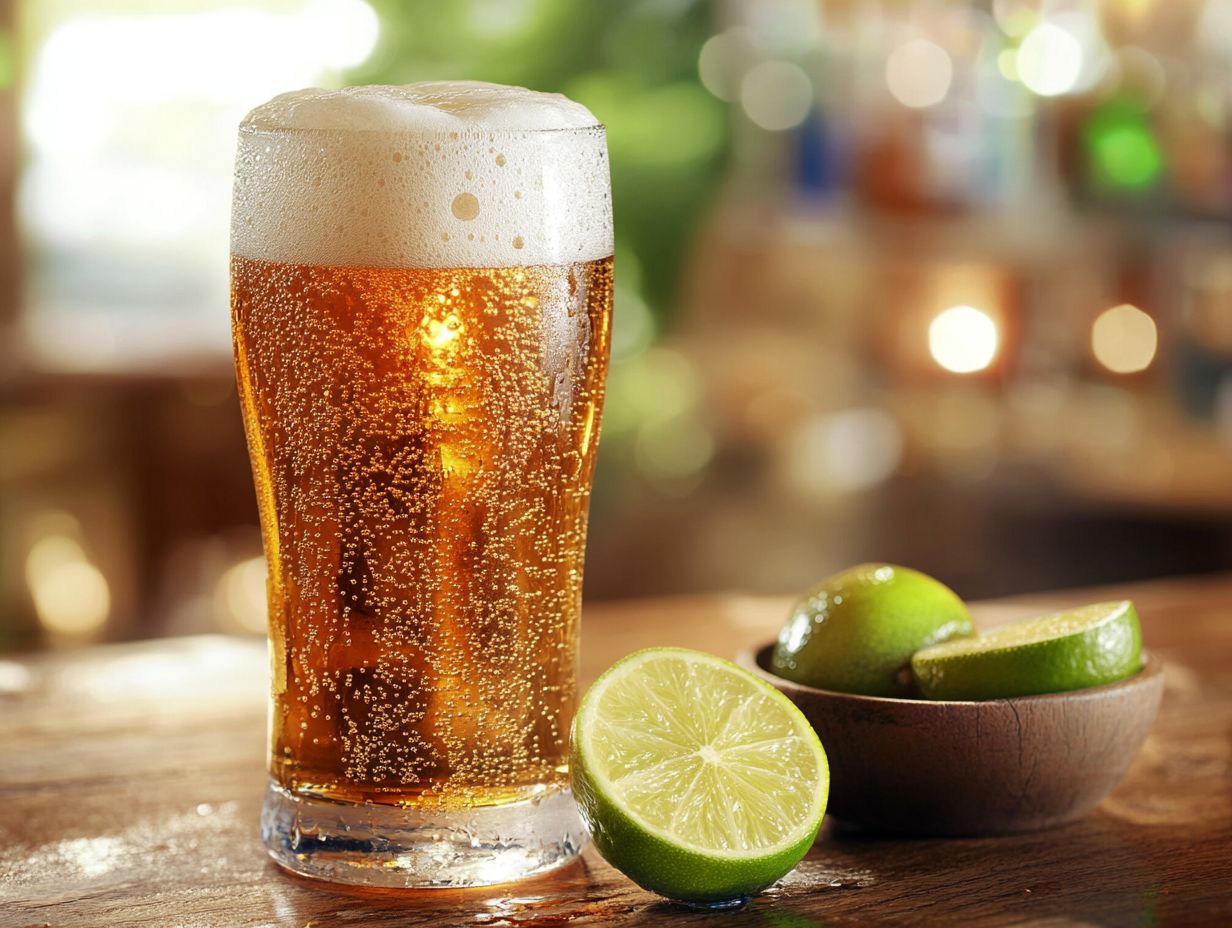
Consulting a beer tasting kit can help analyze these flavors.
The decision to drink beer that has taken on a vinegar-like flavor hinges on the intensity of that vinegar taste and the associated health risks it may pose. Such beer off tastes should be carefully evaluated.
1. Depends on the Intensity of the Vinegar Taste
The choice to consume beer that has a vinegar-like taste ultimately depends on the strength of that vinegar flavor and how it influences the overall profile of the brew.
For some aficionados, a pronounced vinegar note can actually enhance the drinking experience, weaving a rich tapestry of tartness and complexity that beckons further exploration. This lively tang often complements traditional beer flavors, such as the sweetness of malt or the bitterness of hops, resulting in a distinctive tasting adventure that keeps you engaged with each sip.
However, when the vinegar flavor becomes too dominant, it can disrupt the harmony of the beer, potentially lessening your enjoyment. Thus, those with discerning palates may find themselves contemplating the subtleties of the vinegar taste and reflecting on how it shapes the broader sensory journey that each beer offers.
2. Consider the Potential Health Risks
When you think about sipping beer that tastes like vinegar, it s essential to weigh the potential health risks linked to consuming contaminated or poorly brewed beer.
This flavor profile often reveals underlying issues, such as inadequate sanitation practices during brewing or an unfavorable fermentation environment. If the brewmaster hasn t upheld rigorous quality controls, harmful bacteria like Acetobacter a type of bacteria that can spoil beer can flourish, resulting in undesirable sourness and spoilage.
This not only compromises the beer s flavor but may also pose significant health risks. Regularly consuming these kinds of beers could expose you to excessive sourness due to acidity, which can worsen gastrointestinal problems and provoke allergic reactions in those with sensitivities.
It s crucial to act now by understanding the risks of drinking vinegar-tasting beer! Thus, health-conscious consumers like yourself must grasp the importance of proper brewing conditions and maintaining overall beer quality.
How to Prevent Beer from Turning into Vinegar in the Future?
To ensure that your beer remains a delightful brew rather than morphing into vinegar down the line, it s essential to adopt effective strategies that prevent off-flavors and elevate your brewing practices.
1. Proper Storage and Aging
Preventing oxidation issues is paramount to maintaining your beer’s quality.
Implementing proper storage and aging techniques is crucial for maintaining the quality of your beer and preventing the unwelcome vinegar taste that can arise from contamination.
To create the ideal environment for your brew, consider several important factors, such as temperature, light exposure, and humidity levels. Ideally, store your beer in a cool, dark place to protect it from the degrading effects of UV light, as fluctuations in temperature can lead to off-flavors and spoilage.
Aging beer isn t merely about letting it sit; it s about striking the right balance between environmental conditions and the beer style itself. Some styles may benefit from a bit of maturation, while others are best enjoyed fresh and lively.
Using properly sealed containers is essential! This safeguards against oxidation and microbial contamination, ensuring a robust and flavorful experience with every pour.
Crafting the Perfect Beer
In this article, we will explore essential tips for brewing beer that tastes great and avoids unpleasant flavors like vinegar. From ingredient selection to cleaning practices, you’ll learn everything you need to elevate your homebrewing craft!
2. Use Quality Ingredients
Crafting the perfect beer starts with quality ingredients! Using quality ingredients like Cascade hops, Centennial hops, and Debittered Black Malt is essential for crafting a flavorful beer that steers clear of any vinegar-like taste. These beer ingredients contribute significantly to the overall flavor profile.
The selection of these specific ingredients enriches your beer’s flavor profile and plays a crucial role in the overall brewing process. For example, Cascade hops bring a delightful floral and citrus aroma, enhancing both the fragrance and finish of your brew. Centennial hops add balanced bitterness, key to achieving a well-rounded flavor. Meanwhile, Debittered Black Malt offers a rich color without the overwhelming bitterness typically found in darker malts.
By prioritizing high-quality ingredients, you set the stage for a smooth fermentation process. This allows your beer to develop its intended character while avoiding any unwanted off-flavors that can stem from inferior components. This careful choice of ingredients elevates your homebrewing craft.
Off-flavor prevention requires diligence and care through every brewing stage!
3. Keep Equipment Clean and Sanitized
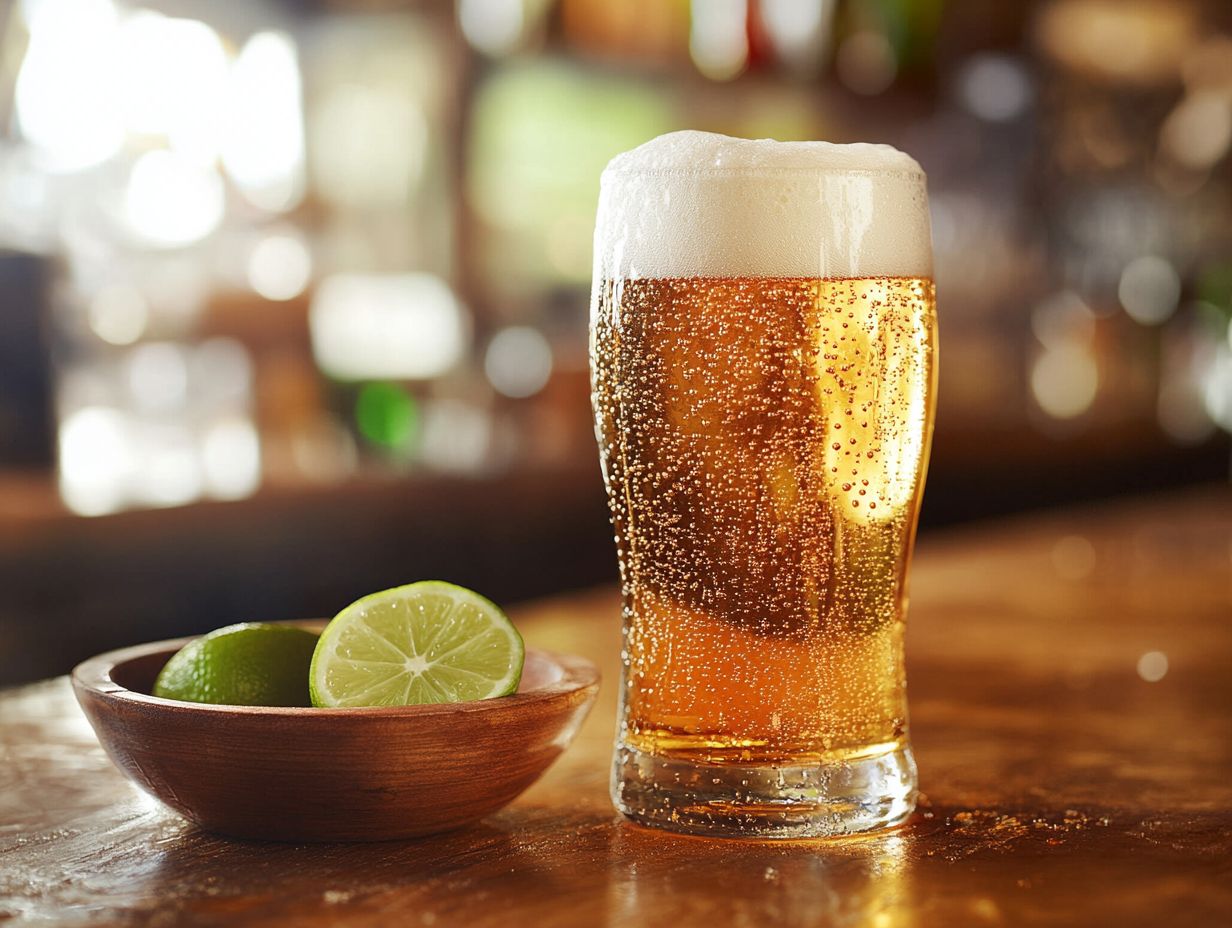
Make keeping your equipment clean a regular habit. Keeping your brewing equipment spotless and sanitized is one of the most effective strategies to prevent contamination and ensure your beer retains its desired flavor profile. This is critical to avoiding common off-flavor causes.
A pristine brewing environment not only enhances the overall quality of the final product but also extends the lifespan of your equipment. By using hot water and safe brewing sanitizers, you can significantly reduce the risk of unwanted microorganisms ruining your brew. Always be mindful of potential oxidation issues that can affect the final product.
Make it a habit to scrub and rinse all your equipment fermenters, hoses, and bottles before and after each brewing session. Consider investing in dedicated brushes and non-residue cleaners to tackle those hard-to-reach areas effectively. This will help in maintaining a consistent beer aroma.
For no-rinse sanitation, think about using a star-san solution; it leaves no off-flavors, ensuring that your beer maintains its crisp taste. With meticulous attention to cleanliness, you can savor the fruits of your labor without the nagging worry of spoilage or off-flavors. Consider using a beer tasting kit to monitor the quality of your brew.
Frequently Asked Questions
What should I do if my beer tastes like vinegar?
If your beer tastes like vinegar, it likely has a bacterial infection. Don t fret; clean your beer lines and equipment thoroughly to prevent future infections. Avoiding fruit flies around your brewing area can also help reduce contamination risks.
Can I still drink my beer if it tastes like vinegar?
While it is not recommended, you can still drink your beer if it has a slight vinegar taste. However, if the taste is very strong and unpleasant, it is best to discard the beer and clean your equipment to prevent any potential health risks. Beer vinegar is not safe for consumption.
Why does my beer taste like vinegar?
There are a few reasons why your beer may taste like vinegar. It could be due to a bacterial infection, improper fermentation, or an old beer that has been exposed to oxygen. Beer tasting can help identify these issues early. Proper sanitation and storage techniques can help prevent these issues.
How can I prevent my beer from tasting like vinegar?
To prevent your beer from developing a vinegar taste, it is important to properly clean and sanitize your equipment before and after each use. You should also make sure to store your beer in a cool, dark place and consume it within a reasonable amount of time. Consider investing in a beer tasting kit to monitor your beer s quality over time.
Can I fix my beer if it tastes like vinegar?
It is difficult to fix a beer that has already developed a strong vinegar taste. However, you can try adding some sugar or fruit juice to mask the taste. It is still recommended to clean your equipment to prevent future infections. Using high-quality beer ingredients from the start can help avoid these issues.
What should I do if my beer consistently tastes like vinegar?
If your beer tastes like vinegar, it s likely a problem with how you make it or the equipment. Don’t let your beer go sour!
Seek advice from an experienced brewer or have your equipment professionally checked and cleaned.
Regularly consult your beer tasting notes to spot any recurring issues.

